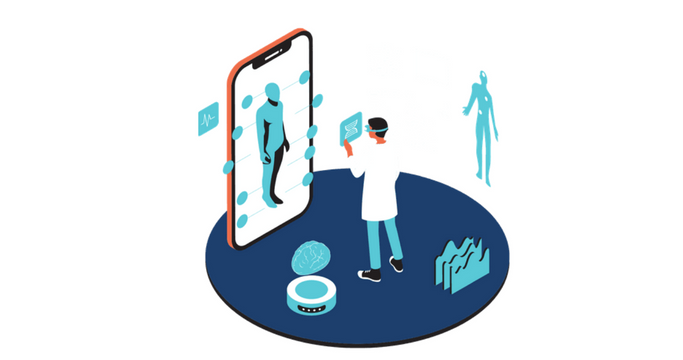From diagnosis and risk assessment, to decision of treatment procedures, there are many open doors for healthcare organizations to convey AI a
From diagnosis and risk assessment, to decision of treatment procedures, there are many open doors for healthcare organizations to convey AI and deliver more impactful, efficient and exact intercessions to their patients.
As the volume of healthcare data keeps on increasing, AI is poised to drive developments and improvements across the care continuum. This is predicated on the capacity of AI tools and machine learning (ML) calculations to deliver proactive, savvy and often hidden insights that illuminate diagnostic and treatment independent direction.
AI can be very beneficial to the two patients and providers when applied in the following areas: further developing care, ongoing disease management, early risk identification, and work process automation and streamlining. To help providers best understand how to take advantage of AI inside their ecosystem, we should investigate the top five benefits of using AI in healthcare.
Population health management
Healthcare organizations can use AI to total and investigate patient health data to proactively identify and prevent risk, close preventive care gaps, and better understand how clinical, hereditary, behavioral and ecological factors influence the populace. Joining diagnostic data, test discoveries and unstructured story data provides a comprehensive perspective on patients’ health and uncovers actionable insights that prevent disease and promote wellness. AI-driven tools can help collate, examine and look at a constellation of such data focused against populace level examples to help uncover early disease risks.
Predictive examination can be gleaned as these data focuses are compiled to provide a view into the general population. These insights can then be used for risk definition of populations based on hereditary and phenotypic factors as well as behavioral drivers and social determinants. Equipped with these insights, healthcare organizations can provide more customized, data driven care while advancing resource distribution and use, and ultimately driving better patient outcomes.
Clinical decision making
Applying artificial intelligence in certain healthcare processes can reduce the time and resources expected to look at and diagnose patients. With this, medical staff can save more lives by acting faster. Machine learning (ML) calculations can identify risk dramatically faster and with considerably more exactness than conventional work processes. Done correctly, these calculations can automate inefficient, manual processes hence accelerating diagnosis and reducing diagnostic errors – – which remains the single biggest cause of medical negligence claims.
Likewise – – AI-empowered solutions can gather and sift through huge reams of clinical data to provide clinicians with a more all encompassing perspective on the health status of patient populations. These solutions give the care group access to constant or close ongoing actionable information brilliantly and spot to drive essentially better care outcomes. Automating the conglomeration and interpretation of the terabytes of data flowing inside the hospital walls permits the entire care group to work at the top of the license.
Improved healthcare accessibility
Studies show critical gaps in the normal future between created and underdeveloped countries as a result of restricted or zero healthcare accessibility. Developing countries fall behind their partners in deploying and utilizing imaginative medical technologies that can deliver appropriate care to the populace. Also, a deficiency of qualified healthcare experts (counting surgeons, radiologists and ultrasound professionals) and appropriately prepared healthcare habitats impact care delivery in such regions. AI can empower a digital infrastructure that facilitates faster diagnosis of symptoms and emergency patients to the right level and methodology of care to encourage a more efficient healthcare ecosystem. Importantly, you can connect with a healthcare app development company in order to get the best healthcare platform to offer well improved healthcare services.
AI-assisted surgery
One of the most imaginative AI use cases in healthcare is in surgical robotics applications. The development of AI robotics has prompted the development of AI surgical systems that can precisely execute the smallest developments with perfect accuracy. These systems can carry out complex surgical operations, hence reducing the typical wait period for procedures, as well as the risk, blood misfortune, complications and possible results of said procedures.
Machine learning also has a role to play in empowering surgical operations. It can provide healthcare experts and surgeons with access to continuous information and clever insights about a patient’s ongoing condition. This AI-upheld information empowers them to make prompt, wise decisions before, during and after procedures to guarantee the best outcomes.
Optimize performance & operational efficiency
Present day healthcare operations are a complex blend of deeply interconnected systems and processes. This makes it very challenging to optimize cost while maximizing asset usage and ensuring low wait times for patients.
Health systems are increasingly using artificial intelligence to sift through the volumes of big data inside their digital ecosystem to gain insights that can help further develop processes, drive efficiency and optimize performance.
Used strategically, AI and ML can provide administrators and clinical leaders with the wisdom to work on the quality and speed of many decisions they need to make each day, consequently working with the smooth progress of patients through different clinical services. Additionally, connect with the AI development company to know more about AI and ML roles in healthcare.
Wrapping up
The rapidly increasing volume of patient data both inside and outside hospital walls indicates that things are not pulling back. Extended by financial difficulties, operational failures, a global deficiency of health workers and increasing expenses, healthcare organizations need technology solutions that drive cycle improvement and better care delivery while hitting vital operational and clinical measurements.
The potential of AI in healthcare could work on the quality and efficiency of the delivery system by examining and extracting wise insights from the gigantic reams of healthcare data is limitless and well-documented.


COMMENTS